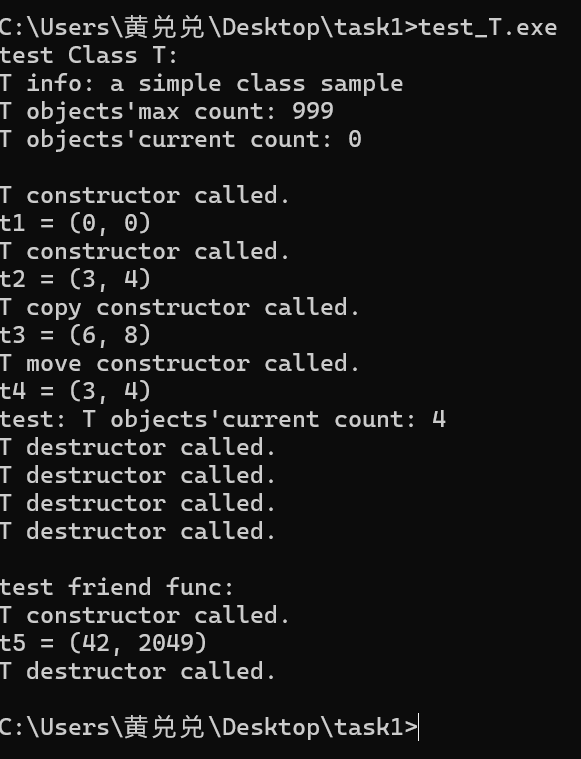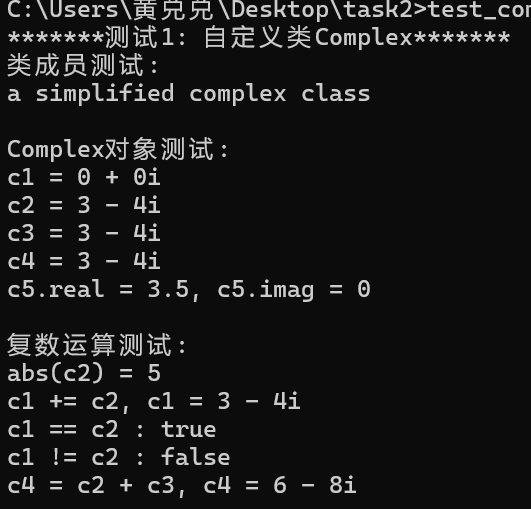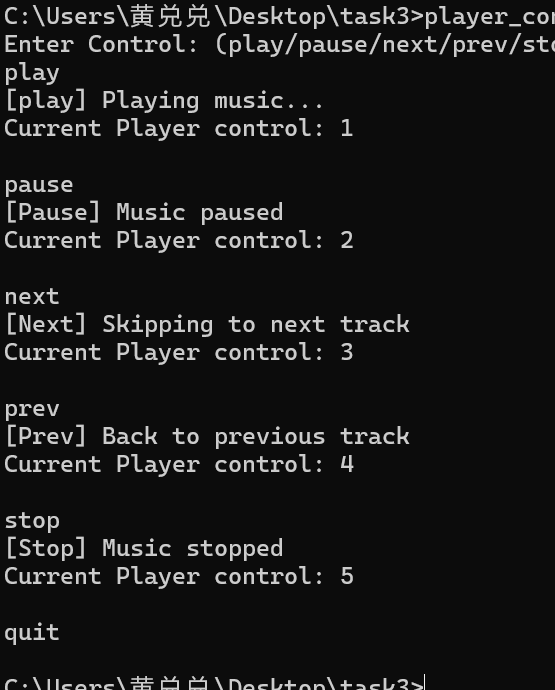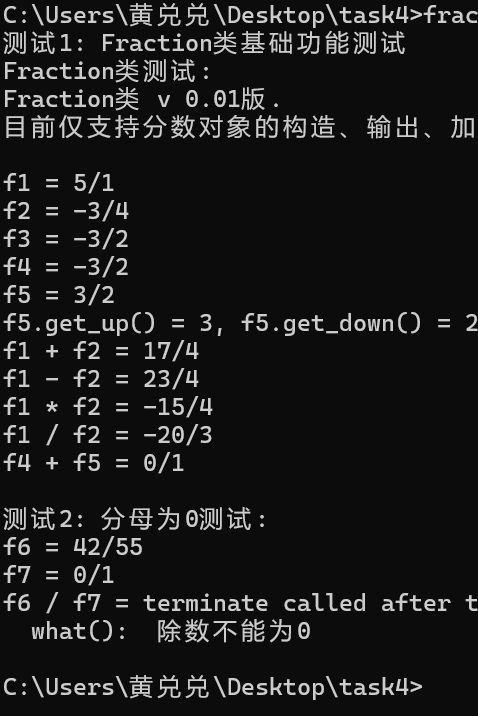实验2 现代C++编程初体验
任务1
源代码
T.h
#pragma once #include <string> // 类T: 声明 class T { // 对象属性、方法 public: T(int x = 0, int y = 0); // 普通构造函数 T(const T &t); // 复制构造函数 T(T &&t); // 移动构造函数 ~T(); // 析构函数 void adjust(int ratio); // 按系数成倍调整数据 void display() const; // 以(m1, m2)形式显示T类对象信息 private: int m1, m2; // 类属性、方法 public: static int get_cnt(); // 显示当前T类对象总数 public: static const std::string doc; // 类T的描述信息 static const int max_cnt; // 类T对象上限 private: static int cnt; // 当前T类对象数目 // 类T友元函数声明 friend void func(); }; // 普通函数声明 void func();
T,cpp
#include "T.h" #include <iostream> #include <string> // 类T实现 // static成员数据类外初始化 const std::string T::doc{"a simple class sample"}; const int T::max_cnt = 999; int T::cnt = 0; // 类方法 int T::get_cnt() { return cnt; } // 对象方法 T::T(int x, int y): m1{x}, m2{y} { ++cnt; std::cout << "T constructor called.\n"; } T::T(const T &t): m1{t.m1}, m2{t.m2} { ++cnt; std::cout << "T copy constructor called.\n"; } T::T(T &&t): m1{t.m1}, m2{t.m2} { ++cnt; std::cout << "T move constructor called.\n"; } T::~T() { --cnt; std::cout << "T destructor called.\n"; } void T::adjust(int ratio) { m1 *= ratio; m2 *= ratio; } void T::display() const { std::cout << "(" << m1 << ", " << m2 << ")" ; } // 普通函数实现 void func() { T t5(42); t5.m2 = 2049; std::cout << "t5 = "; t5.display(); std::cout << '\n'; }
task1.cpp
#include "T.h" #include <iostream> void test_T(); int main() { std::cout << "test Class T: \n"; test_T(); std::cout << "\ntest friend func: \n"; func(); } void test_T() { using std::cout; using std::endl; cout << "T info: " << T::doc << endl; cout << "T objects'max count: " << T::max_cnt << endl; cout << "T objects'current count: " << T::get_cnt() << endl << endl; T t1; cout << "t1 = "; t1.display(); cout << endl; T t2(3, 4); cout << "t2 = "; t2.display(); cout << endl; T t3(t2); t3.adjust(2); cout << "t3 = "; t3.display(); cout << endl; T t4(std::move(t2)); cout << "t4 = "; t4.display(); cout << endl; cout << "test: T objects'current count: " << T::get_cnt() << endl; }
运行结果截图

问题1
不能,友元函数的声明需满足 “先声明,后使用”。在类内部声明func为友元时,编译器需要知道func的函数原型。若删除类外部的void func();声明,类内部的友元声明会因找不到func的完整原型而报错。

问题2
普通构造函数功能:初始化对象的成员变量(如x、y),是对象创建时的默认初始化方式。调用时机:当使用T t;(默认参数)或T t(3,4);(显式传参)创建对象时调用。
复制构造函数功能:用一个已存在的对象t初始化新对象,复制t的成员变量值到新对象。调用时机:当对象被复制时(如T t2 = t1;、函数参数按值传递对象、函数返回对象时)调用。
移动构造函数功能:“窃取” 临时对象(右值)的资源,避免不必要的复制,提高效率。调用时机:当用临时对象(如函数返回的匿名对象)初始化新对象时调用。
析构函数功能:释放对象占用的资源(如动态内存、文件句柄等),完成对象销毁前的清理工作。调用时机:当对象生命周期结束时(如局部对象出作用域、动态分配的对象被delete时)自动调用。
问题3
不能
C++ 中,类的静态成员的定义只能出现一次。若将其剪切到T.h中,当T.h被多个源文件包含时,会导致静态成员在多个目标文件中被重复定义,链接阶段会报错提示 “multiple definition of T::doc”
任务2
源代码
complex.h
#ifndef COMPLEX_H #define COMPLEX_H #include <string> class Complex { public: static const std::string doc; Complex(); Complex(double real); Complex(double real, double imag); Complex(const Complex& other); double get_real() const; double get_imag() const; void add(const Complex& other); friend void output(const Complex& c); friend double abs(const Complex& c); friend Complex add(const Complex& a, const Complex& b); friend bool is_equal(const Complex& a, const Complex& b); friend bool is_not_equal(const Complex& a, const Complex& b); private: double real; double imag; }; #endif
complex.cpp
#include "Complex.h" #include <iostream> #include <cmath> const std::string Complex::doc = "a simplified complex class"; Complex::Complex() : real(0.0), imag(0.0) {} Complex::Complex(double real) : real(real), imag(0.0) {} Complex::Complex(double real, double imag) : real(real), imag(imag) {} Complex::Complex(const Complex& other) : real(other.real), imag(other.imag) {} double Complex::get_real() const { return real; } double Complex::get_imag() const { return imag; } void Complex::add(const Complex& other) { real += other.real; imag += other.imag; } void output(const Complex& c) { if (c.imag >= 0) { std::cout << c.real << " + " << c.imag << "i"; } else { std::cout << c.real << " - " << -c.imag << "i"; } } double abs(const Complex& c) { // 复数模长公式:sqrt(real2 + imag2) return std::sqrt(c.real * c.real + c.imag * c.imag); } Complex add(const Complex& a, const Complex& b) { // 返回两复数相加的结果(新对象) return Complex(a.real + b.real, a.imag + b.imag); } bool is_equal(const Complex& a, const Complex& b) { return (a.real == b.real) && (a.imag == b.imag); } bool is_not_equal(const Complex& a, const Complex& b) { return !is_equal(a, b); }
task2.cpp
#include "Complex.h" #include <iostream> #include <iomanip> #include <complex> void test_Complex(); void test_std_complex(); int main() { std::cout << "*******测试1: 自定义类Complex*******\n"; test_Complex(); std::cout << "\n*******测试2: 标准库模板类complex*******\n"; test_std_complex(); } void test_Complex() { using std::cout; using std::endl; using std::boolalpha; cout << "类成员测试: " << endl; cout << Complex::doc << endl << endl; cout << "Complex对象测试: " << endl; Complex c1; Complex c2(3, -4); Complex c3(c2); Complex c4 = c2; const Complex c5(3.5); cout << "c1 = "; output(c1); cout << endl; cout << "c2 = "; output(c2); cout << endl; cout << "c3 = "; output(c3); cout << endl; cout << "c4 = "; output(c4); cout << endl; cout << "c5.real = " << c5.get_real() << ", c5.imag = " << c5.get_imag() << endl << endl; cout << "复数运算测试: " << endl; cout << "abs(c2) = " << abs(c2) << endl; c1.add(c2); cout << "c1 += c2, c1 = "; output(c1); cout << endl; cout << boolalpha; cout << "c1 == c2 : " << is_equal(c1, c2) << endl; cout << "c1 != c2 : " << is_not_equal(c1, c2) << endl; c4 = add(c2, c3); cout << "c4 = c2 + c3, c4 = "; output(c4); cout << endl; } void test_std_complex() { using std::cout; using std::endl; using std::boolalpha; cout << "std::complex<double>对象测试: " << endl; std::complex<double> c1; std::complex<double> c2(3, -4); std::complex<double> c3(c2); std::complex<double> c4 = c2; const std::complex<double> c5(3.5); cout << "c1 = " << c1 << endl; cout << "c2 = " << c2 << endl; cout << "c3 = " << c3 << endl; cout << "c4 = " << c4 << endl; cout << "c5.real = " << c5.real() << ", c5.imag = " << c5.imag() << endl << endl; cout << "复数运算测试: " << endl; cout << "abs(c2) = " << abs(c2) << endl; c1 += c2; cout << "c1 += c2, c1 = " << c1 << endl; cout << boolalpha; cout << "c1 == c2 : " << (c1 == c2)<< endl; cout << "c1 != c2 : " << (c1 != c2) << endl; c4 = c2 + c3; cout << "c4 = c2 + c3, c4 = " << c4 << endl; }
运行结果截图


问题1
标准库模板类std::complex更简洁。
原因:标准库类直接支持运算符重载和流输出,语法更贴近自然数学表达;而自定义
Complex需通过成员函数(add)或全局函数实现。问题2
是。
output需要访问私有成员real和imag以格式化输出;abs需要计算real和imag的平方和;add需要获取两个复数的real和imag才能计算和。这些函数必须访问私有数据,因此需要声明为友元。否,查阅 cppreference 可知,
std::abs对于std::complex的重载是全局函数,通过complex的公有成员函数(如real()、imag())获取实部和虚部,而非通过友元访问私有数据。 以下情况考虑使用
friend: 函数需要访问类的私有 / 保护成员,且该函数不属于类的成员函数(如全局运算符重载、输出函数);两个类需要互相访问对方的私有成员(如嵌套类或关联紧密的类);避免过度封装导致的功能受限,同时需谨慎使用以防止破坏类的封装性。
任务3
源代码·
PlayerControl.h
#pragma once #include <string> enum class ControlType {Play, Pause, Next, Prev, Stop, Unknown}; class PlayerControl { public: PlayerControl(); ControlType parse(const std::string& control_str); // 实现std::string --> ControlType转换 void execute(ControlType cmd) const; // 执行控制操作(以打印输出模拟) static int get_cnt(); private: static int total_cnt; };
PlayerControl.cpp
#include "PlayerControl.h" #include <string> #include <iostream> int PlayerControl::total_cnt = 0; PlayerControl::PlayerControl() {} ControlType PlayerControl::parse(const std::string& control_str) { // 将输入字符串转换为小写 std::string lower_str; for (char c : control_str) { lower_str += static_cast<char>(tolower(c)); } // 匹配转换后的字符串并返回对应的枚举值 if (lower_str == "play") { total_cnt++; return ControlType::Play; } else if (lower_str == "pause") { total_cnt++; return ControlType::Pause; } else if (lower_str == "next") { total_cnt++; return ControlType::Next; } else if (lower_str == "prev") { total_cnt++; return ControlType::Prev; } else if (lower_str == "stop") { total_cnt++; return ControlType::Stop; } else { total_cnt++; return ControlType::Unknown; } } void PlayerControl::execute(ControlType cmd) const { switch (cmd) { case ControlType::Play: std::cout << "[play] Playing music...\n"; break; case ControlType::Pause: std::cout << "[Pause] Music paused\n"; break; case ControlType::Next: std::cout << "[Next] Skipping to next track\n"; break; case ControlType::Prev: std::cout << "[Prev] Back to previous track\n"; break; case ControlType::Stop: std::cout << "[Stop] Music stopped\n"; break; default: std::cout << "[Error] unknown control\n"; break; } } int PlayerControl::get_cnt() { return total_cnt; }
task3.cpp
#include "PlayerControl.h" #include <iostream> void test() { PlayerControl controller; std::string control_str; std::cout << "Enter Control: (play/pause/next/prev/stop/quit):\n"; while(std::cin >> control_str) { if(control_str == "quit") break; ControlType cmd = controller.parse(control_str); controller.execute(cmd); std::cout << "Current Player control: " << PlayerControl::get_cnt() << "\n\n"; } } int main() { test(); }
运行结果截图

任务4
源代码
Fraction.h
#ifndef FRACTION_H #define FRACTION_H #include <string> class Fraction { public: static const std::string doc; Fraction(int up = 0); Fraction(int up, int down); Fraction(const Fraction& other); int get_up() const; int get_down() const; Fraction negative() const; private: int up_; int down_; void simplify(); static int gcd(int a, int b); }; namespace FractionUtil { void output(const Fraction& f); Fraction add(const Fraction& f1, const Fraction& f2); Fraction sub(const Fraction& f1, const Fraction& f2); Fraction mul(const Fraction& f1, const Fraction& f2); Fraction div(const Fraction& f1, const Fraction& f2); } using namespace FractionUtil; #endif // FRACTION_H
Fraction.cpp
#include "Fraction.h" #include <stdexcept> #include <iostream> #include <cmath> const std::string Fraction::doc = "Fraction类 v 0.01版.\n目前仅支持分数对象的构造、输出、加/减/乘/除运算."; int Fraction::gcd(int a, int b) { a = std::abs(a); b = std::abs(b); while (b != 0) { int temp = b; b = a % b; a = temp; } return a; } void Fraction::simplify() { if (down_ == 0) { throw std::invalid_argument("分母不能为0"); } if (down_ < 0) { up_ *= -1; down_ *= -1; } int common = gcd(up_, down_); if (common != 0) { up_ /= common; down_ /= common; } } Fraction::Fraction(int up) : up_(up), down_(1) { simplify(); } Fraction::Fraction(int up, int down) : up_(up), down_(down) { simplify(); } Fraction::Fraction(const Fraction& other) : up_(other.up_), down_(other.down_) {} int Fraction::get_up() const { return up_; } int Fraction::get_down() const { return down_; } Fraction Fraction::negative() const { return Fraction(-up_, down_); } namespace FractionUtil { void output(const Fraction& f) { std::cout << f.get_up() << "/" << f.get_down(); } Fraction add(const Fraction& f1, const Fraction& f2) { int new_up = f1.get_up() * f2.get_down() + f2.get_up() * f1.get_down(); int new_down = f1.get_down() * f2.get_down(); return Fraction(new_up, new_down); } Fraction sub(const Fraction& f1, const Fraction& f2) { int new_up = f1.get_up() * f2.get_down() - f2.get_up() * f1.get_down(); int new_down = f1.get_down() * f2.get_down(); return Fraction(new_up, new_down); } Fraction mul(const Fraction& f1, const Fraction& f2) { int new_up = f1.get_up() * f2.get_up(); int new_down = f1.get_down() * f2.get_down(); return Fraction(new_up, new_down); } Fraction div(const Fraction& f1, const Fraction& f2) { if (f2.get_up() == 0) { throw std::invalid_argument("除数不能为0"); } int new_up = f1.get_up() * f2.get_down(); int new_down = f1.get_down() * f2.get_up(); return Fraction(new_up, new_down); } }
task4.cpp
#include "Fraction.h" #include <iostream> void test1(); void test2(); int main() { std::cout << "测试1: Fraction类基础功能测试\n"; test1(); std::cout << "\n测试2: 分母为0测试: \n"; test2(); } void test1() { using std::cout; using std::endl; cout << "Fraction类测试: " << endl; cout << Fraction::doc << endl << endl; Fraction f1(5); Fraction f2(3, -4), f3(-18, 12); Fraction f4(f3); cout << "f1 = "; output(f1); cout << endl; cout << "f2 = "; output(f2); cout << endl; cout << "f3 = "; output(f3); cout << endl; cout << "f4 = "; output(f4); cout << endl; const Fraction f5(f4.negative()); cout << "f5 = "; output(f5); cout << endl; cout << "f5.get_up() = " << f5.get_up() << ", f5.get_down() = " << f5.get_down() << endl; cout << "f1 + f2 = "; output(add(f1, f2)); cout << endl; cout << "f1 - f2 = "; output(sub(f1, f2)); cout << endl; cout << "f1 * f2 = "; output(mul(f1, f2)); cout << endl; cout << "f1 / f2 = "; output(div(f1, f2)); cout << endl; cout << "f4 + f5 = "; output(add(f4, f5)); cout << endl; } void test2() { using std::cout; using std::endl; Fraction f6(42, 55), f7(0, 3); cout << "f6 = "; output(f6); cout << endl; cout << "f7 = "; output(f7); cout << endl; cout << "f6 / f7 = "; output(div(f6, f7)); cout << endl; }
运行结果截图

问题
理由:避免友元破坏封装性,通过类的公有接口访问成员,降低耦合。比静态成员函数更符合职责单一原则,工具函数与类分离,逻辑清晰。命名空间可避免函数名冲突,便于扩展,适合集中管理相关运算功能。




 浙公网安备 33010602011771号
浙公网安备 33010602011771号